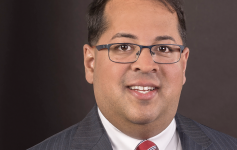I asked former IEEE Power & Energy Society (PES) President Alan Rotz, who recently retired from a 40 year career at PPL Electric Utilities, about his views on the future of energy and whether government should play a part. Mr. Rotz echoed the comments heard from many other experts: it’s a big problem and there’s no silver bullet. Only through a diversified portfolio of energy solutions can we “make the math work out” and deliver the required amount of power to the country. Disappointing as it is to those concerned about climate change, coal must play a part in the transition to sustainable energy. This makes research into carbon sequestration and carbon scrubbing incredibly important. He also sees some potential in biofuels provided land and waste management issues are addressed.
Mr. Rotz foresees two other important developments. First, he projects that the price of natural gas will continue to rise opening the market for alternatives. He noted anecdotally that his own daughter, whose heat was generated by natural gas, was paying approximately 70% more than owners of comparable homes heated by electricity. Second, he offered that as in France, nuclear energy would have to play a much larger role than it does now, though to do so, government reform is needed. He related that nuclear facilities are required to pay the federal government one-tenth of a cent per kilowatt-hour generated to fund a seemingly doomed national nuclear waste depository at Nevada’s Yucca Mountain. Politics has driven Senate majority leader Harry Reid (D-NV) to fight the placement of radioactive waste in his home (and notably a swing) state, meaning not only have funds been reallocated to other purposes, but existing nuclear facilities must pay again to store the nuclear waste they do posses. Approximately $1 billion of fund money has been returned to utilities, but with no alternative nuclear storage plans on the table, examples like these highlight the need for a comprehensive federal energy policy.
Tomorrow, I will conclude this six-part series with Mr. Rotz’s take on the bigger problem in his eyes, state governments, and the issue of Conservation Voltage Regulation (CVR).




Leave a Reply